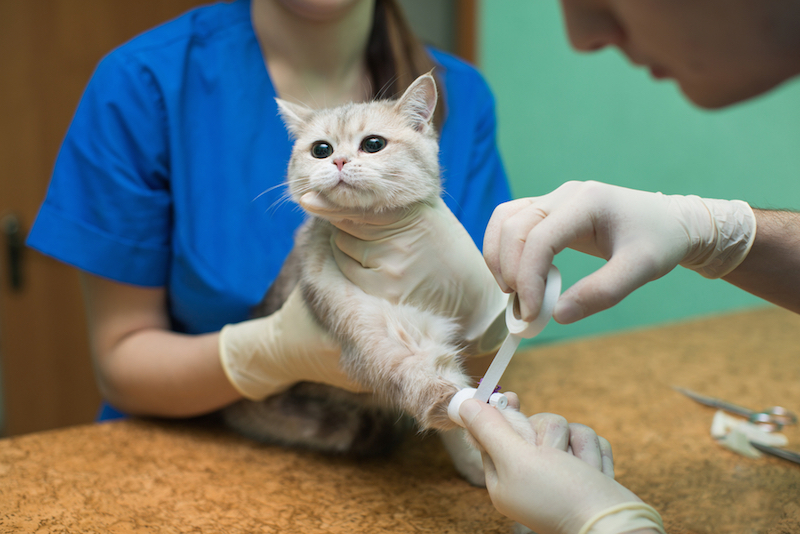Rare Bird Flu Strikes Cats: What You Need to Know

A rare strain of bird flu recently surfaced in sick cats in New York.
Tests have confirmed that 386 cats housed in New York City's Animal Care Centers (ACC) were infected with the H7N2 strain of the influenza virus, The New York Times reported. One veterinarian who had prolonged exposure to the infected cats tested positive and recovered. At least two cats at the shelter died after being infected, one had the virus before it was admitted to an ACC shelter, the Times said.
"Anytime influenza does unusual things, scientists get interested," said Sandra Newbury, director of the Shelter Medicine Program at the University of Wisconsin-Madison, who assisted in identifying the virus strain that was infecting the ACC cats and managing their care. "This is the first time this virus has been detected and transmitted among cats." [6 Flu Vaccine Myths]
But it's not clear how these how the cats contracted the virus in the first place, Newbury told Live Science.
A virus mystery
The new virus first came to light after a deceased shelter cat tested positive for influenza A, Newbury said. Dr. Robin Brennen, the veterinary director of Animal Care Centers of NYC, which runs the shelter where the dead cat was found, contacted Newbury. It wasn't immediately clear which strain of influenza A the cat had, and the experts first suspected it to be the H3N2 strain, which is known to infect dogs.
But Newbury said this hunch was questioned because none of the shelter dogs were ill. Further testing, done through the Wisconsin Veterinary Diagnostic Laboratory, revealed that the dead cat had been infected with H7N2, a strain of influenza A virus that has been known to infect birds. It is, therefore, a kind of "bird flu."
Many local and national animal and health agencies collaborated to quarantine and treat approximately 500 shelter cats, and to look for any continued risk to animal or human health, she said.
Sign up for the Live Science daily newsletter now
Get the world’s most fascinating discoveries delivered straight to your inbox.
Cat flu, but not that "cat flu"
Although it's not common, cats have been known to come down with influenza. The Centers for Disease Control and Prevention (CDC) says that cats with the flu usually experience only mild illness, showing such symptoms as sneezing, coughing, fever, low energy, loss of appetite and a discharge from the nose or eyes. Newbury said in a very rare instances, cats with the flu may develop pneumonia.
But influenza in cats shouldn't be confused with what people often casually call "cat flu." This term often refers to infections with other viruses, such as feline herpes or feline calicivirus, both of which can also cause respiratory infections.
As with humans, influenza virus infections in cats can be spread through the transfer of fluids from an infected cat's eyes, nose or mouth to the eyes, nose or mouth of another cat, according to the CDC. Newbury said this can happen through direct contact between the cats, through a cough or sneeze, or through what's called "fomite transmission," which means that the virus can be transferred from a sick cat to an object, and from that object to another cat.
The spread of the H7N2 virus among the shelter cats could have been a much bigger problem, she said. "In this case, since it is a new pathogen to cats and immunity usually develops with exposure, we would assume that very few cats have immunity to it. That means most cats would be susceptible to infection with the virus," Newbury said. [Flu Shot Facts & Side Effects (Updated for 2016-2017)]
The good news is that […] infections have been reported only in cats that were either housed at the ACC shelter, or were in direct contact with a cat that had been housed at the ACC, she said. Newbury stressed that it's unlikely for a cat to have influenza unless it was adopted from the ACC shelter between Nov. 1 and Dec. 15, 2016. No other animals in the shelter tested positive for the virus.
H7N2 threat to humans
People can pick up an H7N2 infection from cats, as shown by the ACC veterinarian who tested positive, likely through the same ways that the virus spreads from cat to cat, Newbury said. However, as of Dec., 22, 2016, of the more than 350 people who were in contact with the ACC cats and were screened for H7N2, only the one veterinarian tested positive, according to the NYC Health Department. This suggests that even people who are exposed to cats infected with the virus are unlikely to become ill, according to the CDC. The CDC reports there are two previously known cases of H7N2 in people, from 2002 and 2003, and in both cases there was no evidence of human-to-human transmission. Currently, there is no vaccine to protect against H7N2, but the CDC says, "There is a candidate vaccine virus (CVV) in the U.S. pandemic preparedness stockpile that could be provided to flu vaccine manufactures to mass produce a H7N2 flu vaccine in the case of an emergency."
Don't fret over Fluffy
Hearing about changes in the spread of influenza, particularly one with a reputation like bird flu, can be alarming. But Newbury advised against excessive concern in this case. "Most people should not be concerned that their cat has influenza," she said. "If your cat has clinical signs of respiratory disease, it is best to contact your veterinarian."
Original article on Live Science.










